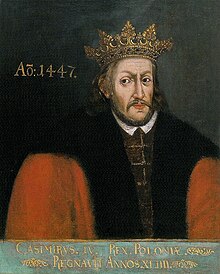You can help expand this article with text translated from the corresponding article in Polish. (October 2020) Click [show] for important translation instructions.
|
| Casimir IV | |||||
|---|---|---|---|---|---|
 Casimir IV, 17th-century depiction by an unknown artist | |||||
| Grand Duke of Lithuania | |||||
| Reign | 29 June 1440 – 7 June 1492 | ||||
| Coronation | 29 June 1440 in Vilnius Cathedral | ||||
| Predecessor | Sigismund Kęstutaitis | ||||
| Successor | Alexander I Jagiellon | ||||
| King of Poland | |||||
| Reign | 25 June 1447 – 7 June 1492 | ||||
| Coronation | 25 June 1447 in Wawel Cathedral | ||||
| Predecessor | Władysław III | ||||
| Successor | John I Albert | ||||
| Born | 30 November 1427 Kraków, Poland | ||||
| Died | 7 June 1492 (aged 64) Old Grodno Castle | ||||
| Burial | Wawel Cathedral, Kraków | ||||
| Spouse | |||||
| Issue Detail | |||||
| |||||
| Dynasty | Jagiellon | ||||
| Father | Władysław II Jagiełło | ||||
| Mother | Sophia of Halshany | ||||
Casimir IV (Casimir Andrew Jagiellon; Polish: Kazimierz Andrzej Jagiellończyk [kaˈʑimjɛʂ jaɡʲɛ(l)ˈlɔj̃t͡ʂɨk] ; Lithuanian: ; 30 November 1427 – 7 June 1492)[1] was Grand Duke of Lithuania from 1440 and King of Poland from 1447 until his death in 1492. He was one of the most active Polish-Lithuanian rulers; under him, Poland defeated the Teutonic Knights in the Thirteen Years' War and recovered Pomerania.
The Jagiellonian dynasty became one of the leading royal houses in Europe. The great triumph of his reign was bringing Prussia under Polish rule.[2] The rule of Casimir corresponded to the age of "new monarchies" in western Europe. By the 15th century, Poland had narrowed the distance separating it from Western Europe and became a significant power in international relations. The demand for raw materials and semi-finished goods stimulated trade, producing a positive balance, and contributed to the growth of crafts and mining in the entire country.[3] He was a recipient of the English Order of the Garter (KG), the highest order of chivalry and the most prestigious honour in England.
Following Casimir's death in 1492, John I Albert succeeded him as King of Poland, and Alexander Jagiellon was proclaimed Grand Duke of Lithuania.[4]
- ^ Frost 2015, p. 327.
- ^ "Casimir iv – Encyclopedia Article and More from Merriam-Webster". Archived from the original on 24 October 2014.
- ^ "Poland – history – geography". Retrieved 13 February 2017.
- ^ "Valentas Šiaudinis. Lietuvos didžiųjų kunigaikščių kova už LDK savarankiškumą 15 a." Voruta (in Lithuanian). 10 January 2020. Retrieved 26 December 2023.